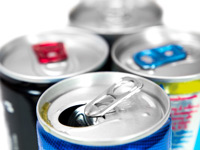 ©iStock/Mauro-Matacchione
©iStock/Mauro-MatacchioneNew research suggests that college students who regularly consume energy drinks are at a greater risk for future alcohol use disorder, cocaine use or nonmedical use (misuse) of prescription stimulants. The research was funded by the National Institute on Drug Abuse (NIDA), part of the National Institutes of Health.
Scientists from the University of Maryland, College Park, asked college students who were approximately 21 years old about their past-year use of energy drinks – highly caffeinated products marketed primarily to teens and young adults. Participants were followed over the next three years to determine whether probabilities of past-year energy drink use increased, decreased or remained consistent, and at year five were assessed for past-year substance use. In groups that showed consistent or increasing probabilities of using energy drinks over the years, researchers found higher rates of cocaine use, prescription stimulant misuse and alcohol use disorder – but not marijuana or tobacco use. This finding held true regardless of how often subjects consumed the drinks (infrequently, occasionally or frequently) and even after accounting for prior substance use and other risk factors.
Although these findings are consistent with animal studies suggesting that caffeine can prime the still-developing teen brain for later drug use, this study does not establish that energy drink consumption directly causes an increased risk for substance use in humans. Further research on energy drinks is needed to guide prevention and policy efforts in teens.
View the abstract of – “Trajectories of energy drink consumption and subsequent drug use during young adulthood”– published in Drug and Alcohol Dependence.
For information about substance use trends in college-age adults, go to: www.drugabuse.gov/related-topics/college-age-young-adults.
For more information, contact the NIDA press office at media@nida.nih.gov or 301-443-6245. Follow NIDA on Twitter and Facebook.
